Archives and Special Collections
Archives, Historical Records, Special Collections
FayFoto archive acquired by Northeastern University Libraries’ Archives and Special Collections
 A leading provider of commercial photography in the greater Boston area for over 80 years, FayFoto Boston provides photographs on assignment for corporate, business, and non-profit clients. The archive consists of over 7.5 million negatives from 1963 to 2006.
A leading provider of commercial photography in the greater Boston area for over 80 years, FayFoto Boston provides photographs on assignment for corporate, business, and non-profit clients. The archive consists of over 7.5 million negatives from 1963 to 2006.
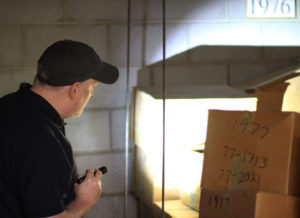
Daniel Lavoie, Collections Archivist, inspects the FayFoto archive before its move to Snell Library.
The photographs in the collection cover a wide range of subjects, including business head shots, architectural interiors and exteriors, corporate event coverage, industrial photography, and product still life. Though the collection primarily consists of historical Boston business photography, it also has a broader local and national historical significance including celebrities, politicians, events, and aerial photography.
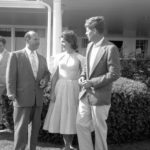
John and Jackie Kennedy at a Hyannis Legislature party. From the FayFoto collection.
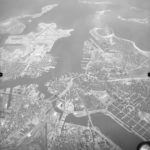
Aerial photograph of Boston, 1960. From the FayFoto collection.
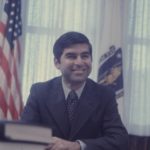
Former Massachusetts Governor Michael Dukakis. From the FayFoto collection.
“We at FayFoto are proud of the part we have played in documenting Boston’s history, but the value of this time capsule would be lost if it stayed in boxes in our studio” Nelson remarks. “We are grateful that the conservators at Northeastern’s Snell Library agreed to undertake the significant effort required to preserve this unique resource and make it accessible to others.”
Celebrating The Phoenix: New England’s alternative newspaper of record
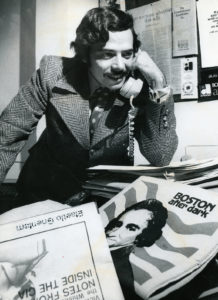 For nearly 50 years, The Boston Phoenix was Boston’s alternative newspaper of record. The first word on social justice, politics, and arts ceased publication in March 2013. Fortunately, the entire Phoenix collection, over 775 cubic feet, is now well-preserved at Northeastern University thanks to media mogul and owner Stephen M. Mindich.
Northeastern University Libraries provide online and in-person access to materials from the Phoenix Media/Communications Group including The Phoenix, The Portland Phoenix, The Providence Phoenix, The Worcester Phoenix, Stuff Magazine, and WFNX 101.7 FM.
Mindich, who passed away on May 23rd, thoughtfully provided Snell Library with the newspapers, and audiovisual materials which are now a part of the Archives & Special Collections, leaving Boston, and beyond, with an important resource legacy that will continue for generations.
Head of Special Collections and University Archivist, Giordana Mecagni notes “Although no longer in publication, its archives will continue to inspire new thought, scholarship, and questioning the status quo. We are very grateful to Steve and the Mindich family for gifting this significant resource.”
Known for its edgy coverage of arts, entertainment, lifestyle and politics, The Phoenix will be part of the foundation of information housed at Northeastern University’s new Boston Research Center. The collection can be accessed at phoenix.library.northeastern.edu
For nearly 50 years, The Boston Phoenix was Boston’s alternative newspaper of record. The first word on social justice, politics, and arts ceased publication in March 2013. Fortunately, the entire Phoenix collection, over 775 cubic feet, is now well-preserved at Northeastern University thanks to media mogul and owner Stephen M. Mindich.
Northeastern University Libraries provide online and in-person access to materials from the Phoenix Media/Communications Group including The Phoenix, The Portland Phoenix, The Providence Phoenix, The Worcester Phoenix, Stuff Magazine, and WFNX 101.7 FM.
Mindich, who passed away on May 23rd, thoughtfully provided Snell Library with the newspapers, and audiovisual materials which are now a part of the Archives & Special Collections, leaving Boston, and beyond, with an important resource legacy that will continue for generations.
Head of Special Collections and University Archivist, Giordana Mecagni notes “Although no longer in publication, its archives will continue to inspire new thought, scholarship, and questioning the status quo. We are very grateful to Steve and the Mindich family for gifting this significant resource.”
Known for its edgy coverage of arts, entertainment, lifestyle and politics, The Phoenix will be part of the foundation of information housed at Northeastern University’s new Boston Research Center. The collection can be accessed at phoenix.library.northeastern.edu
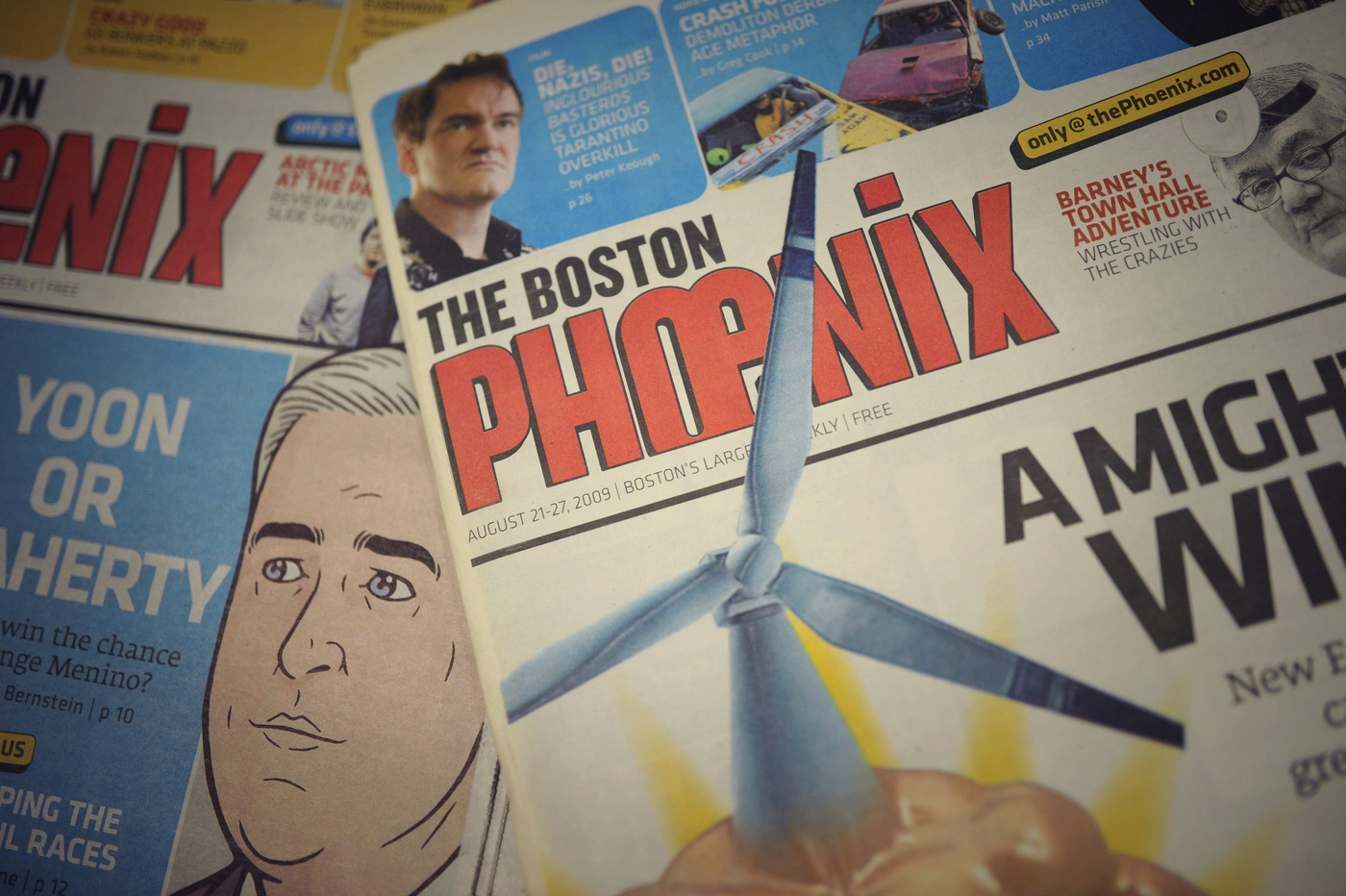
Nov. 23, 2015 – BOSTON, MA. The Boston Phoenix archives inside Snell Library at Northeastern University on Nov. 23, 2015. Photo by Matthew Modoono/Northeastern University
Investigating Northeastern’s Only Medieval Manuscript
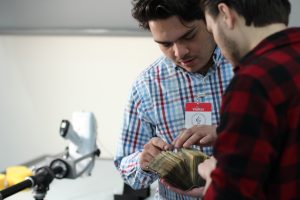 We were inspired by the mystery of the manuscript; very little was known about it before we began our research. The Dragon Prayer Book is beautiful and intriguing, and so multi-dimensional in terms of the questions we can ask of it, e.g. sociological, literary, religious, material, etc. As Northeastern’s only medieval manuscript, the book is an original object which has become a hub of interdisciplinary research. The book has provided a sort of bridge between departments, and each new experiment or test proves this connection to be stronger. With each new discovery we make the book reveals more of itself to us, and with each revelation come new surprises and twists in terms of our research path. While much is known about the book, there is still plenty that can be discovered, or even already known information that can be confirmed.
How did you determine that XRF analysis was the next way forward?
We were inspired by the mystery of the manuscript; very little was known about it before we began our research. The Dragon Prayer Book is beautiful and intriguing, and so multi-dimensional in terms of the questions we can ask of it, e.g. sociological, literary, religious, material, etc. As Northeastern’s only medieval manuscript, the book is an original object which has become a hub of interdisciplinary research. The book has provided a sort of bridge between departments, and each new experiment or test proves this connection to be stronger. With each new discovery we make the book reveals more of itself to us, and with each revelation come new surprises and twists in terms of our research path. While much is known about the book, there is still plenty that can be discovered, or even already known information that can be confirmed.
How did you determine that XRF analysis was the next way forward?
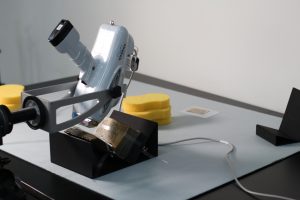 When looking for new ways to interact with and study the Dragon Prayer Book we came across X-ray fluorescence (XRF), a very simple and noninvasive test that produces decisive results. We attended several lectures on the latest developments in biobibliography and other ways that science is being brought to bear on book history and Humanistic questions, and were eager to take advantage of our interdisciplinary expertise and local resources. When Zakary Ganhadeiro joined the project last fall, we were excited by his interest in spearheading the bioanalysis of the Dragon Prayer Book, and by the prospect of gaining a new understanding of the prayer book through the field of bioarchaeology.
What did you discover about the Dragon Prayer Book via XRF analysis?
When looking for new ways to interact with and study the Dragon Prayer Book we came across X-ray fluorescence (XRF), a very simple and noninvasive test that produces decisive results. We attended several lectures on the latest developments in biobibliography and other ways that science is being brought to bear on book history and Humanistic questions, and were eager to take advantage of our interdisciplinary expertise and local resources. When Zakary Ganhadeiro joined the project last fall, we were excited by his interest in spearheading the bioanalysis of the Dragon Prayer Book, and by the prospect of gaining a new understanding of the prayer book through the field of bioarchaeology.
What did you discover about the Dragon Prayer Book via XRF analysis?
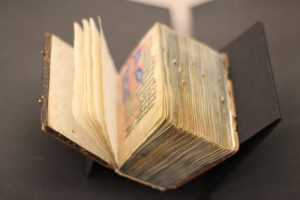 The analysis mostly confirmed what we suspected about the inks– that they were fairly typical for a southern German late medieval manuscript. However, we did learn that the black ink has an unusual amount of zinc in it, which led us to consider investigating the geologic composition of the mines around Regensburg, Germany, where we think the manuscript may have originated.
Why is collaboration important when doing research in 2018?
The analysis mostly confirmed what we suspected about the inks– that they were fairly typical for a southern German late medieval manuscript. However, we did learn that the black ink has an unusual amount of zinc in it, which led us to consider investigating the geologic composition of the mines around Regensburg, Germany, where we think the manuscript may have originated.
Why is collaboration important when doing research in 2018?
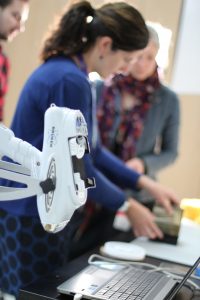 There are so many different kinds of scholarly questions we have about this manuscript, and no one person or tool will ever be adequate to the understanding the complexity of its world. We need a diverse team of experts and different tools of varying sophistication in order to piece together this
knowledge puzzle: experts on bindings, on late fifteenth century music cultures and on their Latin, on ink composition, on tests to determine what kind of animal was used in making the parchment, on manuscript scripts, on early modern paper and watermarks, on websites that best display our findings, on conservation, to name even just a few. You can see some of what we’ve investigated at www.dragonprayerbook.northeastern.edu. Cross communication also allows for the better sharing of ideas, and the better publicizing of research. While this was only a small test, on a larger scale, more collaboration can lead to larger discoveries on all fronts.
How did the Library impact you/your research?
Giordana Mecagni, NU’s archivist has promoted student research on this manuscript from our first expression of interest in it. She found the funds to digitize it, sent it to restoration, and has granted permission to perform non-invasive scientific analysis. She has supported our efforts by facilitating access to the manuscript, including at the public events we have organized. The Library staff has been incredibly supportive and easy to reach throughout this whole process, and they truly made the collaboration with the Isabella Stewart Gardner Museum possible. We recognize that not every archive supports student research in this way, and we are very fortunate to have a Library that promotes our learning to such a degree.
There are so many different kinds of scholarly questions we have about this manuscript, and no one person or tool will ever be adequate to the understanding the complexity of its world. We need a diverse team of experts and different tools of varying sophistication in order to piece together this
knowledge puzzle: experts on bindings, on late fifteenth century music cultures and on their Latin, on ink composition, on tests to determine what kind of animal was used in making the parchment, on manuscript scripts, on early modern paper and watermarks, on websites that best display our findings, on conservation, to name even just a few. You can see some of what we’ve investigated at www.dragonprayerbook.northeastern.edu. Cross communication also allows for the better sharing of ideas, and the better publicizing of research. While this was only a small test, on a larger scale, more collaboration can lead to larger discoveries on all fronts.
How did the Library impact you/your research?
Giordana Mecagni, NU’s archivist has promoted student research on this manuscript from our first expression of interest in it. She found the funds to digitize it, sent it to restoration, and has granted permission to perform non-invasive scientific analysis. She has supported our efforts by facilitating access to the manuscript, including at the public events we have organized. The Library staff has been incredibly supportive and easy to reach throughout this whole process, and they truly made the collaboration with the Isabella Stewart Gardner Museum possible. We recognize that not every archive supports student research in this way, and we are very fortunate to have a Library that promotes our learning to such a degree.Frieda Garcia to be Simmons College honorary degree recipient
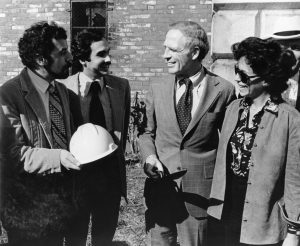
Boston mayor, Kevin White, holds a small garden spade at the groundbreaking ceremony for La Alianza Hispana’s community center. Orlando del Valle holds a construction hard hat, marking the beginning of renovations and construction.